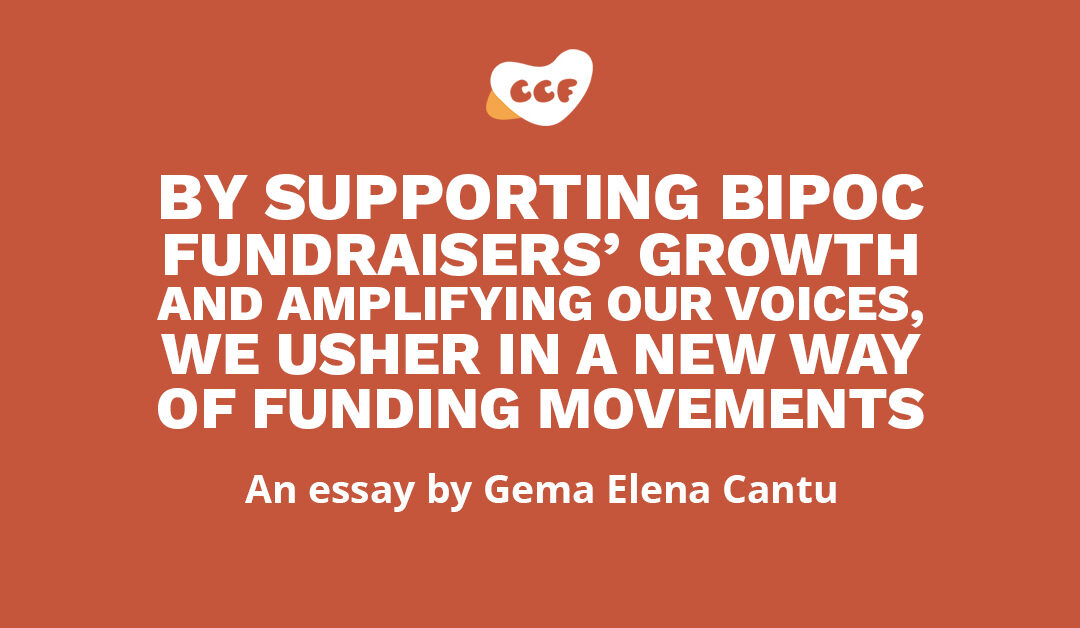By Gema Elena Cantu, Director of Development for LeaderSpring Center
But before pushing for diversity and inclusion, we must really ask ourselves, inclusion of what? Are we aiming to uphold the current status quo in nonprofit fundraising, or are we striving for something that truly transforms our field?
When you’re born and raised in the Mission District of San Francisco, growing up in a low-income, single-parent household, it’s not often that you find yourself having a career in nonprofit fundraising. The concept of fundraising didn’t occur to me until I started to work for a Hip Hop organization in 2016.
During that year, I was walking through the Castro with my ex-boyfriend when a friendly canvasser stopped us, saying, “Hey! Come talk to me about fighting racism with Hip Hop!” Ironically, I was the one who wanted to walk away from the conversation, but my boyfriend at the time said we would return after lunch. And we did. We heard her pitch, donated, and received a Hip Hop CD in return. Little did I know that this interaction would lead me toward a path in fundraising.
It’s been an unconventional journey, navigating the nonprofit sector through firsthand experience. I’ve met incredible, talented, and dedicated people who have inspired, motivated, and encouraged me to continue this career path.
However, along my path, I quickly realized that people of color are severely underrepresented in the development field.
According to a 2022 report by Data USA, the fundraising workforce is comprised of 85% white individuals; 71.3% women and 28.7% men. Hispanic and Latino individuals make up 6.4% of the workforce, individuals of two or more races account for 5.06%, Black individuals: 4.8%, Asian individuals: 4%, and Native American individuals: 0.105%.
This drastic disparity is not lost on me. It highlights the urgent need for greater diversity and inclusion within the fundraising field. But before pushing for diversity and inclusion, we must really ask ourselves, inclusion of what? Are we aiming to uphold the current status quo in nonprofit fundraising, or are we striving for something that truly transforms our field?
I ask this because it’s important to examine the current structures in place before encouraging more people of color to enter a field that is often challenging to succeed in.
What current pathways exist for entering fundraising? What support systems are available for those interested in it? And most importantly, what support exists for those who are already working in it?
And why are so many fundraisers, especially people of color like me, feeling burnt out and frustrated?
The pathway to nonprofit fundraising can be much harder when you come from a low-income background. Whether it’s because of limited access to networks, barriers to education, relationship to money and wealth, and lack of opportunities, these challenges hinder people from underrepresented communities to enter the field or even know that it exists. Meanwhile, most development professionals come from middle- or upper-class backgrounds, where access to resources and opportunities often comes easier to them.
Being a fundraiser is no easy task—it is highly layered. It is both a science and an art form. It requires a deep understanding of power dynamics, cultural norms, and biases. It requires strong communication, writing, and speaking skills, along with having strong relationship building tactics, and effective fundraising strategies. Beyond these skills, fundraisers, especially those committed to transformation and movement work, must know how to navigate and succeed in these colonial frameworks that shape how we work and operate.
Coming from a low-income background, I’ve had to confront imposter syndrome, my relationship to money and wealth, and the pressure to conform to colonial norms, all while facing systemic barriers rooted in power and access. Not to mention, the balancing act of staying aligned with your mission, integrity, and values, while navigating a sector that has limited resources and funding.
And yet, in the midst of all of this, fundraising is truly powerful. It can turn visions into reality by mobilizing resources and people, creating opportunities such as jobs and critical programs, campaigns and so much more.
As a fundraiser, you are a storyteller, a connector, and an advocate for the community you care about. Fundraising builds, sustains, and strengthens movements, and we need more fundraisers, especially fundraisers of color.
However, this sector must create pathways that honor and acknowledge the diverse backgrounds, perspectives, and life experiences of people. We must have training or mentor programs rooted in racial and economic equity, and social justice, in an effort to create innovating pathways that set up folks for success, rather than replicating current structures and treating them as just another cog to the wheel.
We also need to invest in and provide more opportunities for fundraisers of color who are already in the field. We bring such valuable knowledge, perspective, and lived experience, and yet, our voices are still not fully heard or valued in our field.
By supporting our growth and amplifying our voices, we usher in a new way of funding movements that genuinely supports the causes we care about and enhances the quality of life of our people.

Gema Elena Cantu
Born and raised in San Francisco’s Mission District, Gema Elena Cantu (she/her) brings over eight years of nonprofit experience to her role. Leading fundraising efforts, she builds relationships with partners to strengthen Bay Area communities. As a Latinx fundraiser, Gema aims to change traditional fundraising methods by implementing Diversity, Equity, Inclusion, and Belonging approaches.
She advocates for the social sector to support and invest in fundraisers of color and encourages individuals from different backgrounds to engage in community-focused fundraising. Gema strives to create new pathways and approaches that offer new strategies to fundraising, ones that speak to her community, inspiring others to become leaders and drive meaningful change. She also serves as a board member for the Development Executive Roundtable, an organization dedicated to providing educational workshops, training, and events for development and fundraising professionals in the San Francisco Bay Area.
Outside of work, you can find Gema on beautiful hiking trails, the archery range, horseback riding, dancing with her Aztec community, or on the dance floor!
To stay connected with Gema, you can find her on LinkedIn.
Discover more from CCF
Subscribe to get the latest posts sent to your email.


Right on Gema!